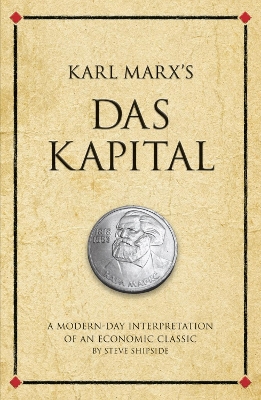Infinite Success
4 total works
An immediate bestseller in 1859, Self-help propelled its author to fame and rapidly became one of Victorian Britain's most important statements on the allied virtues of hard work, thrift and perseverance. Smiles' most celebrated book sold 20,000 copies in its first year, became known as the 'bible of mid-Victorian liberalism' and is the prototype of today's motivational and self-help blockbusters. Steve Shipside's brilliant interpretation of Smiles' Self-help enables twenty-first century readers to put into practice the insights of one of the world's most famous self-improvement books. Discover:
* Why being true to yourself will help you avoid debt;
* That learning to sod the Joneses is the key to happiness;
* How to get back on the horse and learn from failure;
* Why every moment counts when it comes to self-improvement;
* That learning to visualise victory can help you achieve your goals.
This interpretation of Samuel Smiles's Self-help is not a substitute for the original. Its purpose is simply to illustrate the timeless nature of Smiles's insights by bringing them to life in a contemporary context. Samuel Smiles' Self-help is an enlightening, entertaining accompaniment to one of the most famous and inspiring books ever written.
* Why being true to yourself will help you avoid debt;
* That learning to sod the Joneses is the key to happiness;
* How to get back on the horse and learn from failure;
* Why every moment counts when it comes to self-improvement;
* That learning to visualise victory can help you achieve your goals.
This interpretation of Samuel Smiles's Self-help is not a substitute for the original. Its purpose is simply to illustrate the timeless nature of Smiles's insights by bringing them to life in a contemporary context. Samuel Smiles' Self-help is an enlightening, entertaining accompaniment to one of the most famous and inspiring books ever written.
Karl Marx's Das Kapital: A Modern-Day Interpretation of a True Classic
by Steve Shipside
Published 1 January 2009
Since the first publication of The Way to Wealth in the 1750s millions of aspiring entrepreneurs have used Benjamin Franklin's advice to create and maintain profitable businesses. Franklin was a phenomenon - a statesman, scientist, inventor, entrepreneur and best-selling author. Many of his maxims and proverbs have become part of the fabric of western society: "Early to bed and early to rise makes a man healthy, wealthy and wise"; "Nothing but money is sweeter than honey"; "If you would have your business done, go; if not, send"; "Creditors have better memories than debtors." Franklin died a hugely wealthy man and he is still listed in the Wealthy 100: The 100 Wealthiest Americans in History. In Benjamin Franklin's The Way to Wealth Steve Shipside interprets Franklin's text for the modern day. Twenty-first century readers will discover how to:
* Be the driver, not the drone;
* Practice your luck;
* Suppress the desire to acquire;
* Invest in your number one asset, you;
* Tackle time thieves.
Benjamin Franklin's The Way to Wealth is not a substitute for the original. Its purpose is simply to illustrate the timeless nature of Franklin's insights by bringing them to life with modern financial examples. Shipside's brilliant interpretation of The Way to Wealth is an inspiring companion to one of the most famous and influential books ever written.
* Be the driver, not the drone;
* Practice your luck;
* Suppress the desire to acquire;
* Invest in your number one asset, you;
* Tackle time thieves.
Benjamin Franklin's The Way to Wealth is not a substitute for the original. Its purpose is simply to illustrate the timeless nature of Franklin's insights by bringing them to life with modern financial examples. Shipside's brilliant interpretation of The Way to Wealth is an inspiring companion to one of the most famous and influential books ever written.
First published in 1876, Das Kapital is Karl Marx's most important contribution to the world of political economy. Kapital is a critical analysis of capitalism and its practical economic application and also a critique of other related theories. Today it is considered one of the most influential books ever written. Through Marx's criticisms of the vulnerability of free-market capitalism we can see the inevitability of recent financial turmoil. In this timely interpretation, Steve Shipside uses twenty-first century examples and case studies to re-evaluate Marx's text for the new world of business and economics. Today's reader will discover:
* Why bigger business is not necessarily better business;
* How to develop a workforce made up of creative individuals;
* Why a successful business needs to develop a social conscience;
* The best ways to introduce new strategies, systems and technologies to your team;
* Why you need to keep your staff fit, healthy and happy.
This interpretation of Karl Marx's Das Kapital is not a substitute for the original. Its purpose is simply to illustrate the timeless nature of Marx's insights by bringing them to life with contemporary examples. Given the continuing turbulence of the global economy this brilliant interpretation of a classic of political economy couldn't be more timely. Marx's views frequently chime with criticisms of current business practice and gathering anti-globalisation sentiment, making Das Kapital as relevant today as it was 140 years ago.
* Why bigger business is not necessarily better business;
* How to develop a workforce made up of creative individuals;
* Why a successful business needs to develop a social conscience;
* The best ways to introduce new strategies, systems and technologies to your team;
* Why you need to keep your staff fit, healthy and happy.
This interpretation of Karl Marx's Das Kapital is not a substitute for the original. Its purpose is simply to illustrate the timeless nature of Marx's insights by bringing them to life with contemporary examples. Given the continuing turbulence of the global economy this brilliant interpretation of a classic of political economy couldn't be more timely. Marx's views frequently chime with criticisms of current business practice and gathering anti-globalisation sentiment, making Das Kapital as relevant today as it was 140 years ago.


